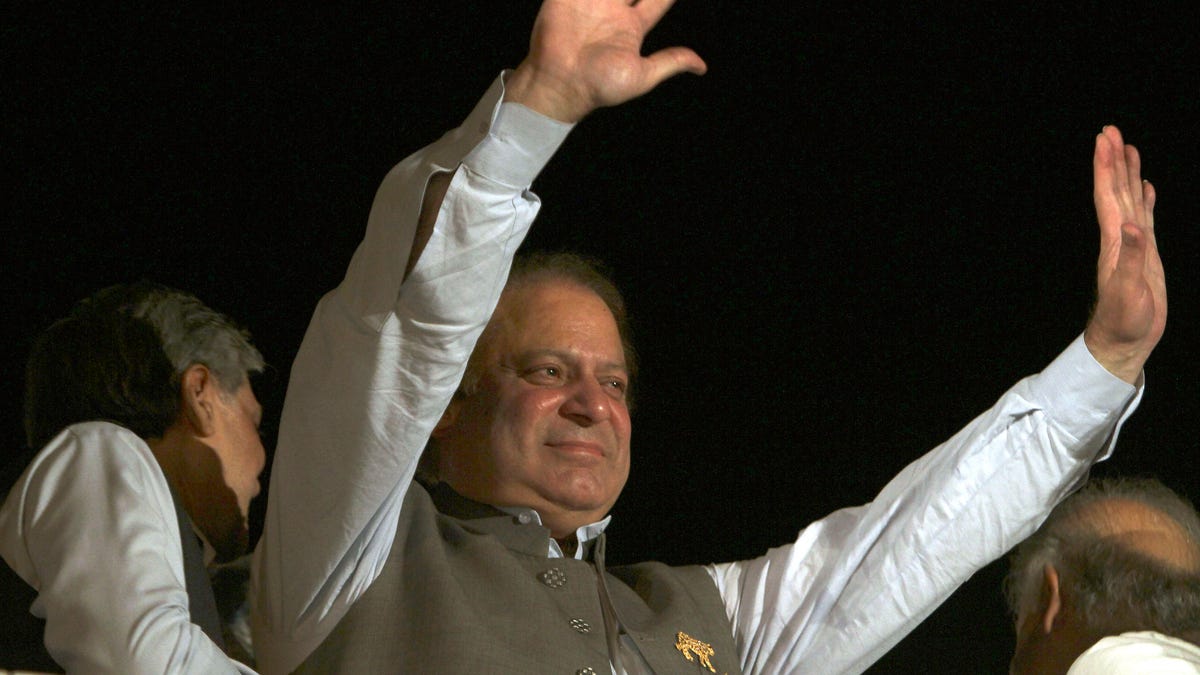
May 11, 2013: Former Prime Minister and leader of the Pakistan Muslim League-N party Nawaz Sharif waves to his supporters at a party office in Lahore, Pakistan. (AP)
The head of Pakistan's military has told the country's incoming prime minister that there is no secret agreement with the United States on the use of drones, FoxNews.com has learned.
Sources tell Fox News that Gen. Ashfaq Parvez Kayani says he will back Pakistan's new leader in an election pledge to counter the U.S. drone campaign, which has stoked anti-American sentiment among voters, and has become more of an issue with both the Pakistani military and the previous administration.
A change in the drone program would mark a distinct shift in U.S.-Pakistani relations. The previous Pakistani government,democratically elected in 2008, tacitly allowed the CIA to continue conducting unmanned aerial vehicle attacks on militants on Pakistani soil.
Nawaz Sharif, the twice-elected former prime minister who will once again lead a new government, has promised to change Pakistan’s foreign and national security policies when he takes office. He has said he will immediately raise the drone issue with the U.S., and wants to end strikes targeting militants in the country’s tribal belt, an area beyond Pakistani government control. Gen. Kayani has agreed to back Sharif on countering America’s drone campaign, according to sources.
Supporters of the U.S. drone strikes say the program has been instrumental in eliminating a large number of high-value targets in Al Qaeda and other extremist groups. According to the North America Foundation database, 355 drone strikes in Pakistan have killed as many as 3,314 people since 2004. Critics of the drone program, however, charge the attacks have had little actual effect on reducing the number of extremists.
Pakistan still harbors and supports America's most wanted. Mullah Omar, spiritual leader of the Afghan Taliban, is believed to hiding in Pakistan, while Hafiz Muhammad Saeed, leader of the terror ring suspected of orchestrating the Mumbai attacks in 2008, roams freely. Al Qaeda's new chief, Ayman Al-Zawahiri, may also be hiding in the rugged, mountainous border between the Pakistan-Afghanistan.
“I think the diplomatic rhetoric of just condemning the strike, logging a complaint to the [US] ambassador, and leaving the issue until the next [drone attack] isn’t the way we’ll handle this,”a senior member of PML-N said, speaking on the condition of anonymity, as he wasn’t authorized to talk to media before the formation of the government strategy. “We need to be given a chance to bring the tribal region under [the] constitutional umbrella.”
Sharif has also said he is willing to talk to the Taliban in an effort to end the violence in the region.
“Many lives have been lost and the economy is in dire straits – if Taliban want to have dialogue, we should seriously consider,” he said in a pre-parliamentary speech on Monday. “Why can’t we talk to the Taliban to make our country peaceful.”
Many observers have questioned why Sharif’s PML-N and Imran Khan, the legendary cricketer turned politician who heads the PTI political party, were spared by the onslaught of attacks by the Taliban in the run-up to elections, while other secular and religious parties were targeted.
